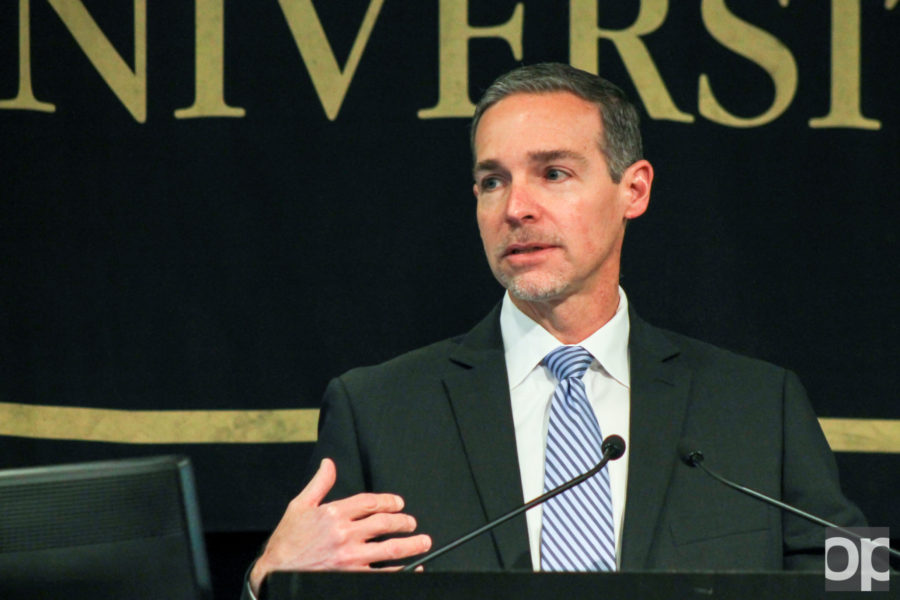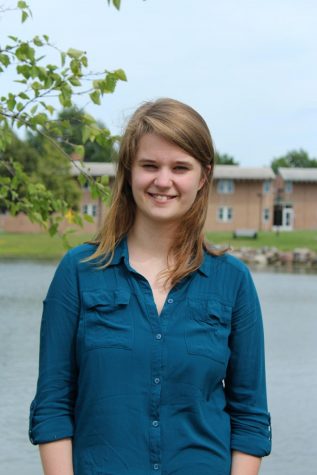Perspective: New COO position raises more questions, few answers
It’s no question that the creation of the new chief operating officer position and subsequent hiring of Scott Kunselman has created a good deal of conflict at Oakland University. I am not sure what President Hynd expected when he decided to create this entirely new position and hire someone within what is, by comparison to other faculty searches, a short time.
Hynd explained to the Oakland Post and in his President’s Report on Nov. 11 that he modeled the chief operating officer position after one at the University of Virginia. Patrick D. Hogan acts as the Executive Vice President and Chief Operating Officer at the University of Virginia. The two positions combine in their work of “overseeing financial operations of the University…and supporting special initiatives that have a University-wide impact,” (virginia.edu/execvp/).
According to the Cavalier Daily, Hogan rakes in $472,800 annually, whereas Kunselman will be making $325,000 a year. Though, Hogan seems to be fulfilling two roles at the university as executive vice president and chief operating officer.
This raised the question – why could Betty Youngblood, vice president for organizational development and strategic planning, not fulfill the chief operating officer role?
In the President’s Report, Hynd explained that as chief operating officer, Kunselman will be aiding in the strategic plan and be a part of the new Strategic Action Committee which will work to put into action any ideas presented by the Strategic Plan Committee. If Youngblood is the VP of strategic planning, wouldn’t it make sense that she aid in a Strategic Action Committee?
Hynd also explained that the search was not as brief as it may have seemed.
“It was probably January when I was talking to our board chair about a possible addition known as the chief of staff,” Hynd explained. “As the board chair and I continued our conversation, and included other board members, that conversation morphed into having someone with the title of chief operating officer.”
Mark Schlussel, the Board of Trustees’ chair, remembered differently, stating that “I looked at my notes, we had this discussion as early as February or March.”
Now, this could be a simple lapse in memory on either Hynd’s or Schlussel’s part, though it is mildly assuring that the idea of this position was put into place months prior. Yet, the process was still not nearly as drawn out as even faculty employment searches.
Kenneth Mitton, president of OU’s chapter of the American Association of University Professors (AAUP), commented that previous searches for deans at the university required presentations in front of the entire faculty.
Mitton disagrees with how the hiring went about, but hopes that the position proves valuable.
“The new fellow (Kunselman) is going to have the job of finding out where staff need help and assisting them, which isn’t a bad concept or bad idea,” Mitton said. “I just would have done it differently.”
Mitton’s understanding of the job description is about as detailed as was provided by the president and Kunselman. There is no formal job description, nor was there an outline of the restructuring of the executive hierarchy to include this position.
Hynd explained that Kunselman will be reporting to the board through him and Schlussel stated, “the chief operating officer position is going to be an operating position reporting to the president.”
But in what capacity?
Hynd mentioned in his formal report that the COO will be handling the structural issues while he is away representing the university to alumni and potential donors. So will Kunselman be reporting to the board? Or will they be reporting to him in Hynd’s absence?
Another question raised is whether or not the hiring is a conflict of interest.
“I think it’s important to note that it would have been a clear conflict of interest if I had somehow been on the board at the time that the board was voting on such an action, that would’ve been inappropriate,” Kunselman explained.
“Once the president made the decision to put this position in place and came to the conclusion that I could be a strong candidate given my background…then the first thing I did was resign from the board to prevent any conflict of interest.”
This one had me scratching my head because Kunselman resigned from his Board of Trustees’ position only two days prior to his hiring as the new COO. Did the board bring about the idea and make the decision within those two days? Or was Kunselman not present at board meetings in which the new position was discussed?
If anyone picked up a copy of last week’s issue of the Post, you would have noticed that it does not really matter if it was a conflict of interest because according to the revised policy 406, “no arrangement undertaken by the university is void or voidable or may be challenged by a third party under this policy.”
This means that any decision made by the BOT concerning a conflict of interest of a Trustees’ member cannot be challenged.
“I’m not sure that I see much of a conflict of interest, in fact what I see is a huge advantage because of his knowledge base,” Hynd said.
Yes, I am glad that Kunselman has had three years of experience on the board and on the facilities committee at the university. Kunselman also has over thirty years of experience at Fiat Chrysler and worked within facilities there.
Yes, he makes sense as a candidate for the position, but not without a national search and without the inclusion of other faculty members.
Hynd, himself, even admitted that the hiring was “an atypical way of doing things in academia, and that had the situation been otherwise, we would have done a national search.”
Given the recent tuition raise which has already caused controversy, the creation of a six-figure salaried position and hiring of someone to that position should have been done entirely differently. I have hope that the position will be prove valuable to the university, but have lost some trust in our university leaders because of the way this was handled.
During his report, Hynd implored people to be patient and stated that positive returns should be noticeable within three to six months from the position. Schlussel agreed saying “I think it will be good for the students, faculty and the board.”
Let’s hope so.










